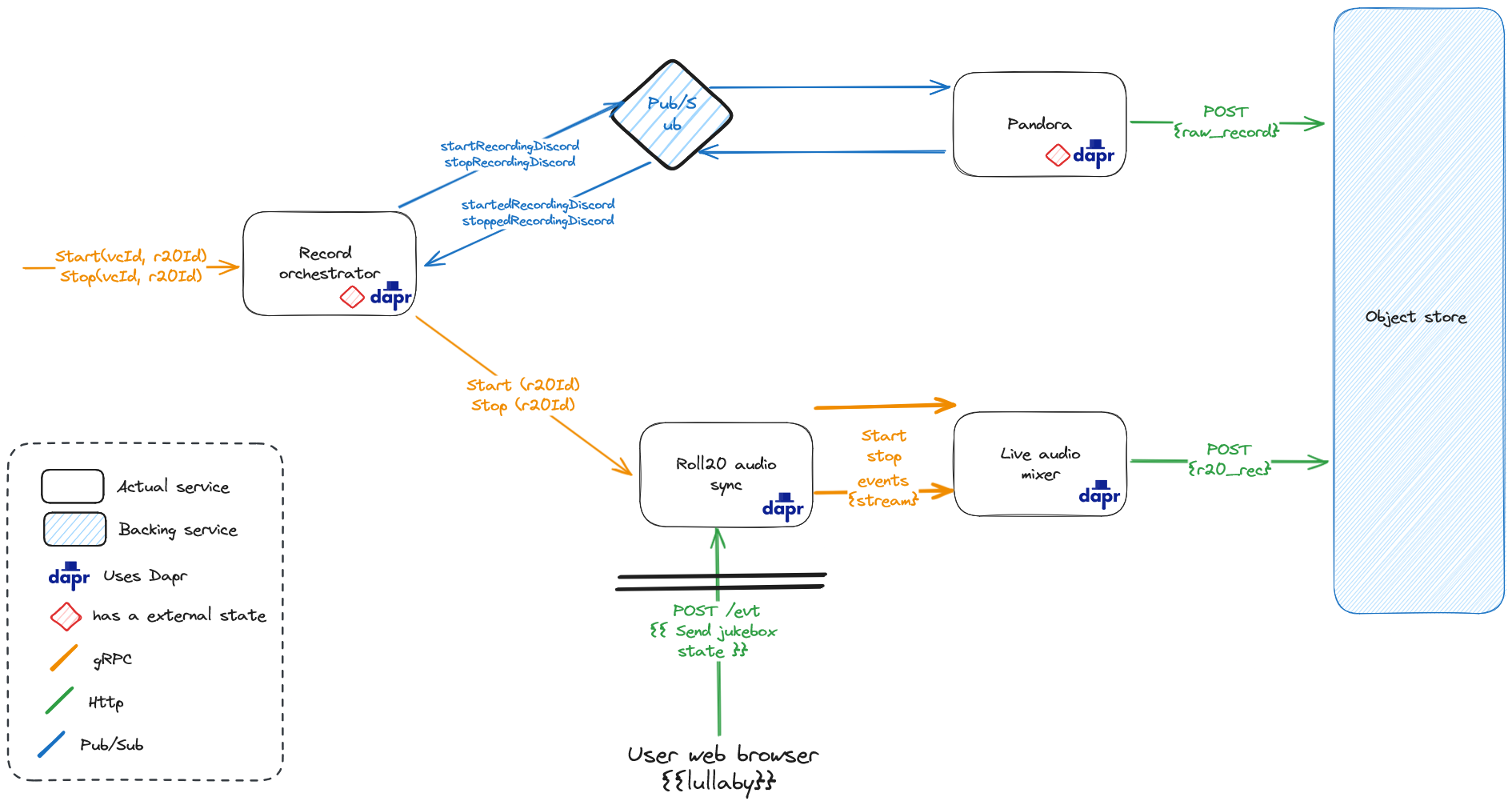An orchestration-based saga to record audio from Discord and Roll20 at the same time to be later mixed used in a podcast.
This orchestrator has the following responsibilities:
- Start and stop the recording of audio from Discord and/or Roll20
- Maintain the state of the recording
The orchestrator controls two main parts:
- The Discord recording system with Pandora
- The Roll20 recording system, with the syncer and live audio mixer
The recorder uses a gRPC API. The proto file is available in the proto folder.
To start the recording, send a request to the start endpoint of the orchestrator service.
| Parameters | Description | Required |
|---|---|---|
voiceChannelId |
The ID of the Discord voice channel you want to record | Yes |
roll20GameId |
The ID of the Roll20 game you want to record | No |
You can find the ID of a Discord voice channel by enabling the developer mode in the Discord settings, right-clicking on the voice channel and selecting "Copy ID".
The ID of a Roll20 game is the number in the URL of the game. For example, if the URL of the game is https://app.roll20.net/campaigns/details/1234/my-game, the ID is 1234.
grpcurl -plaintext -d '{"voiceChannelId": "your_channel_id", "roll20GameId": "your_game_id"}' localhost:50051 recorder.RecordService/StartThe response is an object containing which services are being recorded. For example, if both Discord and Roll20 are being recorded, the response will be:
{"discord": true, "roll20": true}To stop the recording, send a request to the stop endpoint of the orchestrator service. This has the same parameters as the start endpoint.
| Parameters | Description | Required |
|---|---|---|
voiceChannelId |
The ID of the Discord voice channel you want to record | Yes |
roll20GameId |
The ID of the Roll20 game you want to record | No |
grpcurl -plaintext -d '{"voiceChannelId": "your_channel_id", "roll20GameId": "your_game_id"}' localhost:50051 recorder.RecordService/StopThe response will contain the key that can be used to retrieve the recordings from the object store.
{"discordKeys": ["discord_key1", "discord_key2"], "roll20Key": "roll20_key"}Pre-requisites:
The following backing services are required:
- A state storage solution. Redis is used, as it comes with Dapr by default.
- A pubsub solution. Redis is used, as it comes with Dapr by default.
- An object store. Minio is used here, as its close to the S3 API. A minio container will be started a bit further down.
To start the project, clone the projects repositories:
git clone https://github.com/SoTrxII/record-orchestrator
git clone https://github.com/SoTrxII/roll20-audio-sync
git clone https://github.com/SoTrxII/live-audio-mixer
# For the JS project, also install the dependencies
git clone https://github.com/SoTrxII/Pandora && cd Pandora && npm install && cd ..Then start the project.
cd record-orchestrator
# Start the backing services
./deploy/start-dependencies.sh
# Start the orchestrator
dapr run -f ./deploy/recorder.yamlThe orchestrator uses the following environment variables:
| Name | Description | Default |
|---|---|---|
SERVER_PORT |
Port used for the orchestrator gRPC server | 55555 |
DAPR_GRPC_PORT |
Port used by the dapr sidecar. Automatically provided on proper deployments | 50001 |
PUBSUB_NAME |
Dapr component name for the pubsub component | pubsub |
ROLL20_NAME |
Dapr app-id for the roll20 recorder service invocation | roll20-audio-sync |
STORE_NAME |
Dapr component name for the state store | statestore |
